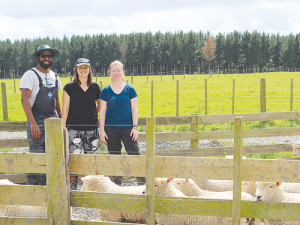New research from Massey University suggests that lambs can be successfully weaned lighter and earlier, with benefits for the mother as well.
The university’s Sheep Research Centre has shown lambs of ewes feeding on a legume-based diet can be successfully weaned at about 50 days old when they are as light as 16kg.
Under the correct conditions, the early weaning allows the lambs to grow faster and the ewes to regain more body condition before the next breeding season.
Traditionally, weaning occurs at 10 - 12 weeks after lambing, when the milk from the ewes reduces; this is a critical factor in the future performance of lamb and ewe.
The study, funded by Beef + Lamb New Zealand, is the work of Massey’s Dr Rene Corner-Thomas, Dr Lydia Cranston, Professor Steve Morris and Professor Paul Kenyon.
Corner-Thomas says that early weaning can have advantages for ewe and lamb.
“There is a gradual decline in milk production after ewes reach peak milk production within three weeks of lambing. Weaning early allows the ewe more time to gain body condition before the new breeding season starts in the autumn,” she explains.
“This is important when summers are dry and late spring is the only chance a ewe has to gain good condition before the next breeding season.
“For the lamb, earlier weaning is an advantage when their growth rate is restricted by ryegrass and white clover pasture covers below 1000kgDM/ha in late lactation.”
Corner-Thomas says in these conditions weaning early onto a legume-based diet will increase the growth rates of the lamb.
The ewe will also maintain her body condition. The legume-based diet can either be a herb clover mix or a pure lucerne stand.
“If ryegrass pasture masses are above 1400kgDM/ha however, there is likely little benefit from early weaning for the lamb, but it is still positive for the ewe.”
Previous studies have shown that when early weaned lambs are slaughtered at a traditional weaning age the dressing out percentage of lambs did not differ from those sent directly to slaughter off their mother.
The Massey team will do further research this spring to determine the optimum management of early weaned lambs. This study by PhD student Jay Ekanayake will have three main focuses.
Firstly, to determine if lambs can be weaned as light at 14kg onto a herb clover mix and still achieve suitable growth rates.
“Studies have also successfully used herb and clover mixes and lucerne monocultures to grow these young lambs. Many lambs can be finished to slaughter weight on a relatively small area of these crops,” explains Corner-Thomas.
Secondly, the researchers will look at the best management of the lamb prior to early weaning, to ease its transition.
And thirdly, it will determine if there are any negative impacts of early weaning on the health of the ewe’s udder.
Further studies are planned for 2018 to examine potentially lighter weaning weights and ages.



















